Answer these simple questions and we will find you the BEST prices
Which type of solar quotes do you need?
It only takes 30 seconds
100% free with no obligation

Get up to 3 quotes by filling in only 1 quick form

Compare quotes and find yourself the best deal

Increase the value of your home by installing a new boiler
- Householdquotes.co.uk
- Boilers
- Gas Boilers
Gas Boilers for Home Heating in the UK: In-Depth Guide

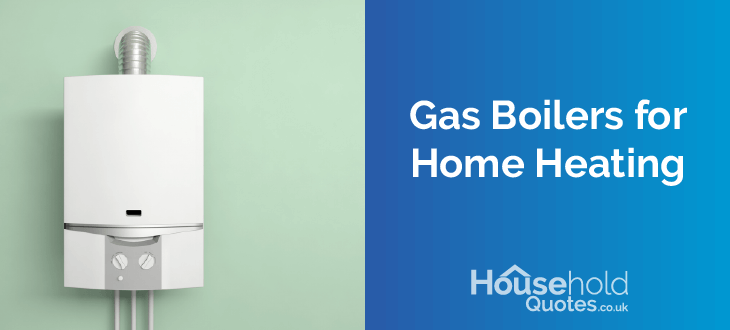
- Gas boilers are the most popular heating system with 23 million homes utilising them in the UK in 2024.
- A-rated gas boilers tend to have a 92% to 95% efficiency and can save over £550 a year in running costs compared to a G-rated boiler with under 60% efficiency.
- Boilers that lose their efficiency can go as low as 60% (G-rating), costing hundreds of pounds in wasteful gas bills.
Despite the plethora of alternatives, gas boilers are still the most popular type of home heating system in the UK. Widely available and fairly cheap, over 23 million homes are equipped with gas-based water and central heating in the UK. Let’s take a deeper look at the benefits, disadvantages, efficiency rates, and prices of the best boilers on the market in this category.
But if you need a new boiler, the best way to get an accurate understanding of what heating system suits your home is to have it assessed by a professional installer. This will require finding a reliable one, which could take days of strenuous research and price comparisons if undertaken on your own. If that sounds like a chore, we can offer a far better solution.
With our service, you can quickly and easily obtain up to 3 free, non-binding quotes from trusted installers in your area. We’ve vetted them ourselves, so you can rest assured that they are providing the best prices and quality service. Click the button below and fill out a 30-second form to receive the best boiler quotes.
- Quotes from local installers
- Payment by finance available
- Save up to £975
It only takes 30 seconds

What is a gas boiler?
Gas boilers are heating systems that utilise fossil fuels and electricity to provide hot water and/or central heating for homes and other types of buildings. Any property connected to a gas main can make use of a standard gas boiler while those not connected can make use of Liquid Petroleum Gas (LPG) if the boiler allows for it.
They are usually the cheapest option for most homes, although their dependence on gas makes them potentially volatile in terms of operating costs. Non-condensing gas boilers used to be the main type in the UK but they have recently been dethroned by condensing boilers, helped by modern regulatory standards. The latter condenses the gas and makes use of it more effectively with less waste.
How does a domestic gas boiler work?
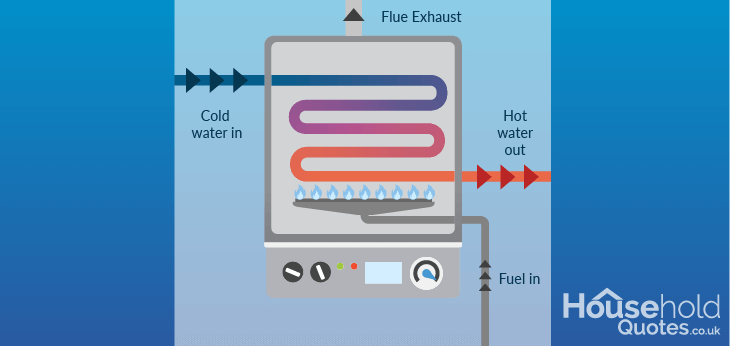
Gas boilers pass fuel through a gas valve, pushing it to a combustion chamber using small jets. Using electricity, the boiler ignites the fuel and creates heat in the process. A pipe then takes cold water and heats it using the heat from the ignition.
Since gas is highly flammable, it provides a lot of heat for little energy consumed. Comparatively, electric boilers take a lot more energy to generate the same level of heat. Gas is also quite convenient compared to oil or LPG because gas mains are available to most UK homes (although there are exceptions).
All gas boiler types in the UK
Gas boilers come in 3 main types:
- Combi gas boilers
- System gas boilers
- Conventional gas boilers
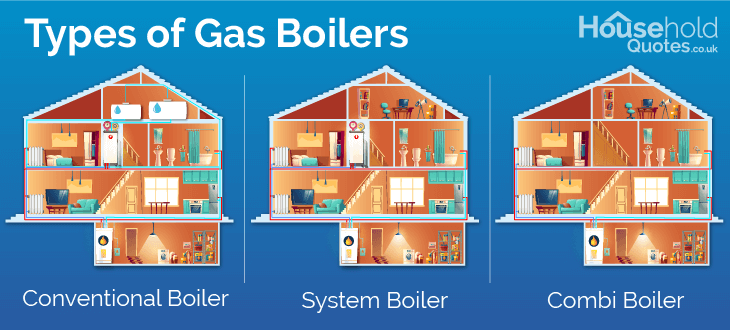
Combi gas boiler
A combi boiler is the most compact type of boiler, requiring far fewer parts and also being very easy to install. Combi boilers take water directly from the water main and heat it up, providing hot water on demand. This eliminates the need for having a storage tank but also limits the number of taps that can run on a combi simultaneously.
Combi boilers are well-suited for smaller homes with one bathroom as they have a low total hot water capacity. They are often the cheapest option but they are not built for every kind of property. Aside from larger homes, they can also be unsuitable for properties with low water pressure or older pipes.
System gas boiler
A system boiler can be a great option for homes with higher hot water demand. These boilers rely on storing hot water in a cylinder for later use which allows for simultaneous taps to run without any problems but this also means that, once emptied, the tank can take some time to refill. In terms of size, system boilers can be a good middle-ground between combis and conventional gas boilers.
System boilers are great for homes with multiple bathrooms but the cylinder you install needs to match the hot water demand of your home. These are the best for the average family living in a medium-sized home, but there are system boilers with higher capacities that can easily manage the water needs of large properties.
Regular/conventional gas boiler
A regular boiler requires the most space out of all the boiler types, often with components being housed in a loft or attic. They are a valid option for older, larger homes but can require complex pipework. They also have a lot more components than their combi and system counterparts, requiring a hot-water storage cylinder and a cold-water storage tank.
Conventional boilers can be difficult to replace since they require extensive pipework installation or removal. This makes it easier to switch from conventional to another type of boiler than vice versa. They are also less common nowadays since they tend to take up a lot of space and older models have comparatively lower efficiencies.
How efficient are gas boilers in the UK?
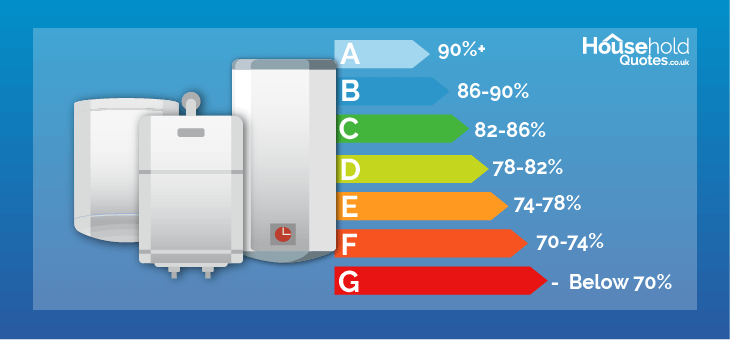
One of the ways to quickly gauge how efficient a boiler could be is to look at its ErP rating.
Boiler efficiency is indicated by ErP ratings which were introduced by the European Union. They range from “A” (even “A+++” for certain appliances) to “G”, with anything above “A” representing beyond 90% and “G” representing any boiler below 70%. Almost all modern boilers start off with an A rating, however, many operate below A since they lose efficiency over time.
| ErP rating (gas boilers) | Energy Efficiency % |
|---|---|
| A | 90% and above |
| B | 86-90% |
| C | 82-86% |
| D | 78-82% |
| E | 74-78% |
| F | 70-74% |
| G | Below 70% |
It’s worth noting that the table above relates to gas boilers and that different types of boilers tend to have variances in ratings. Electric boilers can be 99-100% but still have a “D” rating. This is because the electric grid is still heavily reliant on fossil fuels so they aren’t automatically less carbon-intensive unless they are hooked up to solar panels or renewable energy sources.
If you’re looking for an efficient boiler, you may want to consider contacting a reliable professional. They can give you an accurate estimate of how to navigate energy ratings. However, finding one can take days of research if done on your own. Thankfully, our service can speed up this process and cut out all the effort on your part.
All you have to do is fill out a 30-second form and we’ll do the rest. Click the button below to receive up to 3 free, non-binding quotes from reliable installers in your area.
- Quotes from local installers
- Payment by finance available
- Save up to £975
It only takes 30 seconds

Aren't gas boilers banned from 2025 onwards?
A supposed gas boiler ban has been a popular point of discussion, although calling it a ban can be deceptive. While there are plans to phase out boilers in new properties, consumers will still be able to replace their old gas boilers with new ones after 2025 if they have a pre-existing property i.e., built before 2025. This ban will only apply to newly built homes.
There are plans to roll out a more extensive ban in 2035 but this may get postponed (like it has been before). After that point, there is a chance gas boilers will be unavailable on the mass market. This is meant to transition the UK towards less direct fossil fuel usage and encourage a move towards renewable energy.
These policies are part of Future Homes Standard and will also include oil and LPG boilers. Once such a ban is put in place, consumers can instead opt for electric boilers, heat pumps, or biomass boilers.
How much do gas boilers cost?
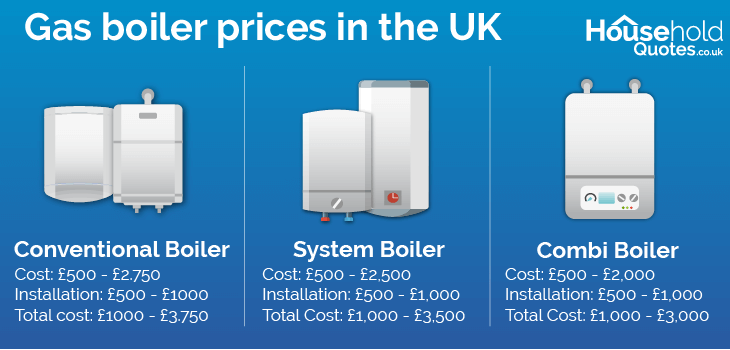
When choosing a boiler, you also need to factor in the operating costs, which is where the fuel type comes into play.
| Fuel prices in England, Scotland, and Wales (pence/kWh) | |
|---|---|
| Natural gas | 7.42 |
| Oil | 9.0 |
| Wood pellets | 13.8 |
| Electricity (standard rate) | 28.62 |
| Electricity (off-peak economy 7) | 16.35 |
| Electricity (on-peak economy 7) | 33.44 |
While the data above is handy, the best way to find out what boiler will suit your needs best is to call a professional. A reliable installer can personally assess your situation and help you make the right calls while helping navigate grants and prices. The only problem is that finding the right one can take days of in-depth research, calling up companies, and fielding their offers on your own. However, we provide a better way.
With our handy service, you can easily obtain quotes from installers we’ve thoroughly vetted. All you have to do is fill out a 30-second form and we’ll handle the rest. Click the button below to receive up to 3 free, non-binding quotes from the best companies in your area.
- Quotes from local installers
- Payment by finance available
- Save up to £975
It only takes 30 seconds

Are there any gas fired boiler grants?
There are no grants specifically for gas boilers. However, you can acquire an ECO4 grant for any boiler that improves your home energy rating, which can include A-rated gas boilers. The value of the grant depends on how much improvement getting your home to an A-rating will require. The lower your current home rating, the higher the potential grant.
To be eligible for ECO4, your home must have an EPC rating of E or below while also being a recipient of one of the following benefits:
- Income-based Job Seekers Allowance
- Income-related Employment and Support Allowance
- Income Support
- Pension Credit Guarantee Credit
- Working Tax Credit
- Child Tax Credit
- Universal Credit
- Housing Benefit
- Pension Credit Savings Credit
- Child Benefit
Savings with a new home gas boiler
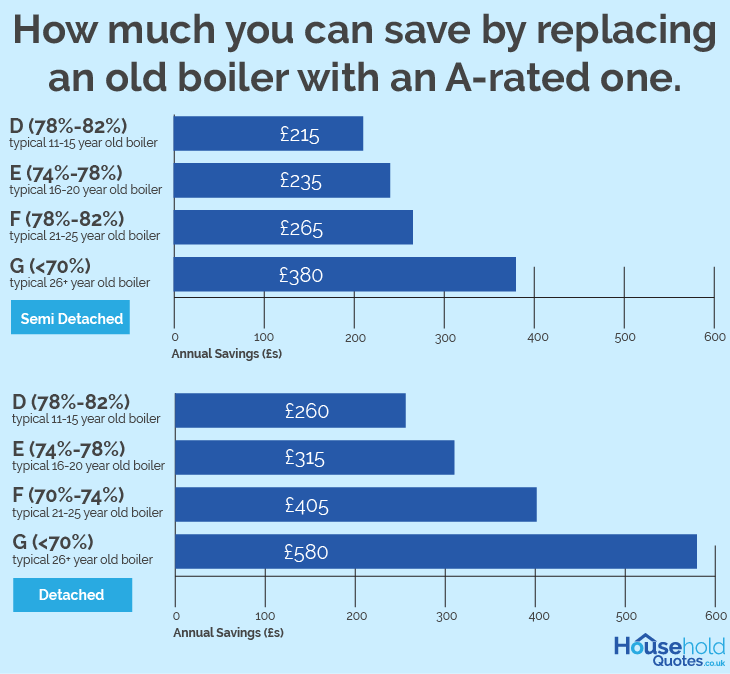
An A+ rated boiler can save about 30% on your average energy bills which can amount to over £550 for households that switch from a G-rated boiler. The difference in efficiency isn’t the only reason one might save money with a new boiler since frequent repairs on old boilers can be costly on their own.
While service and maintenance can help keep a boiler fairly efficient, it is never a guarantee. This is why you should definitely replace your boiler after 15 years. What you lose in heating bills due to the drop in efficiency could cost you more than the price of a boiler over time.
Find the best gas boiler suppliers in the UK
Finding an efficient boiler can potentially be the difference between 100s of pounds annually. Shifting to an A-rated boiler can also improve the value of your property and help decrease the level of energy you waste.
Installing a boiler is a lot of work and it takes a reliable installer to do it properly. That’s why it’s important for you to get the right person for the job. Unfortunately, this often takes days of research and calling up companies to get quotes if done on your own. If that sounds like too much of a hassle, you should try our service.
You can quickly and easily obtain up to 3 free, non-binding quotes from installers in your area. All you need to do is fill out our 30-second form and give us some basic information about what you need. Click the button below to get started.
- Quotes from local installers
- Payment by finance available
- Save up to £975
It only takes 30 seconds

FAQ
Yes. Gas boilers use both gas and electricity to generate hot water. Most gas boilers use about 100-200 watts of power.
While gas can have volatile prices, it is still the cheapest fuel source. Gas boilers can thus be worth it but they may be made unavailable for newly built properties after 2025.
Gas boilers tend to last 10 to 20 years. With proper maintenance, they can survive up to two decades but will inevitably lose efficiency. New boilers allow for better savings on heating.
After two decades, a gas boiler should be replaced. Boilers lose efficiency, costing you more in bills, and can become dangerous if it leaks. Continuously repairing a boiler can be more expensive than buying a new one.

Rawal is an ex-tech journalist with a passion for sustainable innovations, green policies, and their adoption. With a straightforward writing style meant to be easily digested but full of handy tips, they are geared towards readers of all levels of familiarity with the technologies and home appliances covered.
